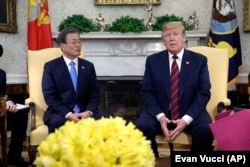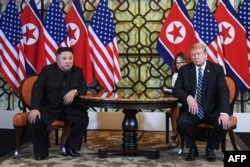VOA Korean Service reporter Joeun Lee contributed to this report.
WHITE HOUSE — Sitting alongside South Korea's president at the White House, U.S. President Donald Trump expressed willingness to hold another summit with North Korea's leader to try to reach a sweeping denuclearization deal.
"A third summit could happen," said Trump. "It's step-by-step. It's not going to go fast."
There are various "smaller deals that could happen," Trump responded to a reporter in the Oval Office when asked if he would accept any agreements shy of denuclearization.
"But right now, we're talking about the big deal," which is "we have to get rid of the nuclear weapons."
Trump, responding to another reporter, said he has decided not to toughen sanctions on Pyongyang, but wants the existing "sanctions to remain in place."
South Korean President Moon Jae-in, in his remarks, described the process as still moving forward. Moon has been a booster of the summits between the leaders of the United States and North Korea, which have never established diplomatic relations.
The South Korean president told Trump that the first summit the U.S. president held in Singapore with Kim in June of last year led to a significant reduction of tension on the Korean peninsula and there is a need for a third summit to be held.
"Now peace has prevailed," Moon, speaking in Korean, told Trump. "We believe you will be able to solve this problem and the dramatic turnaround is solely due to your strong leadership."
Trump declined to say if he had been in communication with Kim in recent weeks.
"Kim Jong Un will be the winner of the Trump-Moon meeting," according to Professor Sung-Yoon Lee of the Fletcher School at Tufts University.
"We coordinate so closely with them regularly and the relationship is just ironclad," State Department Deputy Spokesman Robert Palladino said about Moon's government when questioned at a briefing about the differences in approach to North Korea that are evident between Seoul and Washington.
Lee told VOA the U.S. and South Korean presidents still "stand far apart on a host of issues," including Kim's intentions, South Korea's desire to lessen sanctions on the North, the share of costs Seoul should pay for hosting U.S. troops, differing views on the assertiveness of China, and the lack of military and intelligence cooperation between Seoul and Tokyo.
"Regardless of diplomatic niceties expressed at the summit this week, Moon's stance will continue to harden against Trump's," Lee predicted.
Trump has held two summits with Kim — the most recent one in February in Hanoi, ending early with no agreement as the North Koreans demanded sanctions relief and the U.S. delegation called for North Korea to give up its nuclear weapons.
"It is important that we regain the momentum on denuclearization talks that was lost at the Vietnam summit, and today's talks are an important step," California Democrat Ami Bera, who is co-chair of the Congressional Caucus on Korea, told VOA. "We must continue to work in lock-step with our South Korean partners to find the best possible path forward. It is also vital that Congress be given an opportunity to weigh in on the process and assert its oversight authority over any agreement the administration reaches."
Moon has been a proponent of incremental measures toward denuclearization, with the United States using the relaxation of some sanctions as a way to entice North Korea to negotiate and begin to take steps of its own.
U.S. Senator Cory Gardner told VOA's Korean service it would be a mistake for the United States to give Kim what he wants without making firm demands in return.
"I don't support relieving pressure until we have that denuclearization or concrete steps toward it," said Gardner, a Colorado Republican who chairs the Senate's foreign relations subcommittee on the East Asia-Pacific region.







